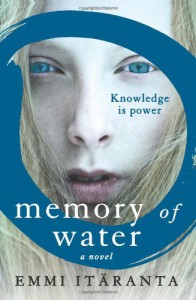Memory of Water: A Novel
 51. MEMORY OF WATER, BY EMMI ITÄRANTA
51. MEMORY OF WATER, BY EMMI ITÄRANTAAnother recommendation from Tytti. This one is science fiction, and, for some reason, I didn’t expect it. This is one of those books with deceitful covers; you think they’re one thing, but it turns out they’re something else entirely.
Synopsis: In a post-ecological-catastrophe world, where food is scarce and fresh water is the most precious resource, Noria is apprenticed to be tea-master after her father. He tells her the secrets of the way of the tea, including the existence of a fresh water spring in the nearby caves; this must be kept a secret at all costs, since all fresh water is property of the government and hiding it is a “water crime”, which can be punished by death. During a moment of civil turbulence, Noria finds a secret of her own, and is tempted to follow it to the end.
Overall enjoyment: I liked it A LOT, in spite of the problems. It is a young adult sci-fi book and there is NO OBSESSION WITH ROMANCE, NO CONDESCENSION TO THE READERS, NO REBELLION FOR THE SAKE OF REBELLION, because teenagers are just like that, and that is enough reason for celebration. There is no denoted romance; there is some subtextual, and it’s between Noria and another girl. Plus, it’s a highly enjoyable read, not without its flaws, but very engaging.
Plot: It is a bit disappointing. Let’s see how I can put this without giving spoilers… She goes for a fatalistic, tragic ending, and it doesn’t fit perfectly with the story. The biggest problem here is that it’s such a short book, you kinda feel cheated when that happens. A lot of the text is dedicated to setting the background; that is no problem at all, it’s necessary to the narrative, and it’s interesting and pleasant to read. But, once that part is finally done, and you’re sure Noria is about to embark on an adventure and the action proper is going to start, the book ends. She could have done the fatalistic, tragic ending and still given us the adventure part, but ending the story as soon as it begins is a bit awkward.
Characters: Noria and Sanja (Noria’s “gal-pal”) are the only characters that are truly developed. And Sanja’s is kind of an incidental development, and she can be prone to sudden changes in personality. The book is told in first person, though, with Noria as the narrator, so that’s to be expected, since you only get Noria’s impressions. Noria herself is a good enough character.
World/setting: This was done well and badly at the same time. On one hand, I really liked the idea of the post-apocalyptic future where the ice caps have melted and the sea has claimed most of the land and the fresh water resources in it. Her characters truly live in this world, they don’t feel like 20th century people who have been transported to a different time. She pays attention to certain crucial details that really make this world come alive. On the other hand, she skips some parts that she really shouldn’t, and that goes hand in hand with the fact that this book is too short. Maybe she had a word limit? That would explain it…
Anyway, I only knew that China ruled Europe because it says so on the blurb. Some cities, government institutions, and people have Chinese sounding names, and they have the tea ceremony tradition, but that’s it. Nobody alludes to it, nobody talks about how they’re being governed by a different people, there’s no change in language, nothing. The big secret that Noria finds is, basically, that the government is lying to people; but the reader doesn’t know what it is. We aren’t told what is the truth; we don’t even know what is the lie. There are rebellions happening but we have no idea what they’re about. This kind of thing really needs to be worked out, especially since it’s important to the story.
Writing style: I was going to compliment the translator for a really good job on this book, but I’ve just found out that the author herself translated it. That’s gotta be worth some respect, at the very least.
Representation: There aren’t any characters that are explicitly POC (now that I think about it, it’s possible that the high-ranking officers were Chinese, but nothing is said about it). There isn’t, explicitly, any queerness, either, but that’s mostly because there’s very little romance; it’s definitely secondary to the story. Still, I’m very much convinced that Noria and Sanja are a couple.
Political correctness: The problem I have in here is actually the opposite: this book is quite preachy. The fact that people don’t want her to become a tea master because she’s a woman is repeated many times, in a very self-righteous way. The reason why humanity is living in these extreme circumstances of almost no water is, of course, because of ecological disasters, but the constant comment of “why did they throw it away? it’s still almost functional!” is excessive and, well, preachy and self-righteous. It could have been done more subtly. But, of course, it’s better than outright intolerance.
Up next: Scrum, by P. D. Singer



